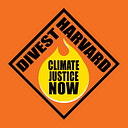HARVARD FACULTY VOTES FOR DIVESTMENT RESOLUTION
In Landslide Vote, Professors Call on University to Divest its $40 Billion Endowment
CAMBRIDGE, MA — The Faculty of Arts and Sciences, Harvard University’s largest academic division, called on the university to divest from the fossil fuel industry. By a 179–20 vote, the motion expresses an overwhelming desire for urgent and meaningful action in a time of climate crisis.
Harvard, which controls a $40 billion endowment, has defended its economic ties to the fossil fuel industry for years. But as industry engagement fails to produce meaningful reductions in carbon emissions, calls have grown for more impactful strategies. “Today’s vote sends a clear message: Harvard’s current approach just isn’t working,” said student activism group Fossil Fuel Divest Harvard after the vote. “No less than the future of our planet is at stake, and if Harvard wants to be a leader, it can start by listening to its own experts.”
The resolution’s text calls on Harvard to “withdraw from, and henceforth not pursue, investments in companies that explore for or develop further reserves of fossil fuels” and “ensure that any adviser who may be unwilling or unable to comply is replaced by one who is willing to carry out these instructions.” As no major fossil fuel company has, as of yet, given up its exploration for or development of new resources (in 2018, all fossil fuel majors sanctioned new projects incompatible with the Paris Accords), such language likely would result in large-scale divestment from the industry as a whole.
The vote is advisory in nature, as only the Harvard Corporation, the institution’s highest governing board, has the authority to order divestment. Nevertheless, the vote puts significant pressure on the University to listen. “I am delighted to see the Harvard faculty come together in this way,” said Edward Hall, Chair of the Philosophy Department and key supporter of the resolution. “If the Corporation follows through on our request, it will be a ray of hope at a time that desperately needs them.” Nicholas Watson, the resolution’s lead sponsor and Chair of the English Department, agreed: “Up till now, anyone with an interest in promoting inaction on fossil fuel divestment has been able to point to statements made by the university in defense of our own inaction and say ‘this is Harvard’s position.’ Now we can say back, ‘it’s not the position of Harvard faculty, any more than it’s the position of Harvard students and many alumni.’ ”
The vote comes in the wake of months of faculty discussions at which advocates laid out the moral, economic, and political reasons for divestment. In the course of those debates, faculty published a climate action white paper laying out how, after taking the first step of divestment, Harvard can be a leader in addressing the climate crisis. And, it’s only one example of the growing consensus for climate justice on campus: last semester alone saw a student protest at the Harvard-Yale game that made international headlines, the launch of a Board of Overseers campaign focused on climate justice, numerous high-profile alumni calling for divestment, and more.
“The status quo when it comes to investment strategy has lost the confidence of the faculty,” said Kirsten Weld, Professor of History.
Harvard has, in the past, divested from holdings it deems “deeply repugnant and ethically unjustifiable,” including from companies supporting the Apartheid regime in South Africa, the tobacco industry, and firms that were deemed complicit in the Darfur Genocide. And, there is ample precedent for bringing the same strategies to the climate crisis. Funds managing over $13 trillion dollars, including the University of California and half of all universities in the UK, have already divested in full or in part from the fossil fuel industry. “It’s clear that the companies profiting from a climate crisis rise to the standard of moral repugnancy,” said Joseph Winters, a Harvard senior and organizer with Fossil Fuel Divest Harvard. “Our university literally has veritas — truth — as its motto. It’s high time it rejects the lies of an industry intent on destroying our planet and our futures.”
For the faculty, today’s vote is just one step in the broader struggle for climate justice. The student campaign has pledged to escalate actions leading up to an Earth Day 2020 deadline for divestment, pro-divest alumni are organizing fellow alums and running for Board of Overseers, and the Medical School Faculty Council is voting on a similar resolution in the near future, among other efforts. “We are willing to listen and debate in a collegial fashion,” said Virginie Greene, Professor of Romance Languages and Literatures, “but I cannot imagine that those of us involved in the campaign (faculty, alumni, staff and students) will accept anything amounting to business as usual.”
“I always admire my colleagues for their excellent judgment,” said Joyce Chaplin, Professor of History, “but maybe never more than today.”
